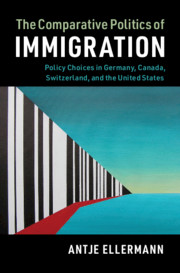 The Comparative Politics of Immigration
The Comparative Politics of Immigration Explaining Permanent and Temporary Economic Admissions
Published online by Cambridge University Press: 27 February 2021
This chapter examines Germany’s politics of economic immigration policy making over the course of five decades. The first case study examines the establishment of Germany’s guest worker system through a series of bilateral treaties in the 1950s and 1960s, followed by the 1973 recruitment stop. After the recruitment stop, political elites used the experience of unintended and large-scale immigrant settlement to construct a national narrative of Germany as a “country of non-immigration.” The second case study examines the reopening of guest worker recruitment channels – this time with Central and Eastern European sending states – in the 1990s. The chapter’s third case study examines the Green Card program of 2000 which marked Germany’s first foray into high-skilled immigration and, despite its limited recruitment success, marked the beginning of a debate that sought to reframe (high-skilled) immigration as being in Germany’s national interest. Our final case study examines the passage of the 2004 Immigration Act by Germany’s first Social Democratic-Green government. The Act signifies the failure of paradigmatic reform: rather than being a historic milestone, it left in place the recruitment stop and provided for the admission of high-skilled immigrants only the basis of regulatory exemptions.
To save this book to your Kindle, first ensure [email protected] is added to your Approved Personal Document E-mail List under your Personal Document Settings on the Manage Your Content and Devices page of your Amazon account. Then enter the ‘name’ part of your Kindle email address below. Find out more about saving to your Kindle.
Note you can select to save to either the @free.kindle.com or @kindle.com variations. ‘@free.kindle.com’ emails are free but can only be saved to your device when it is connected to wi-fi. ‘@kindle.com’ emails can be delivered even when you are not connected to wi-fi, but note that service fees apply.
Find out more about the Kindle Personal Document Service.
To save content items to your account, please confirm that you agree to abide by our usage policies. If this is the first time you use this feature, you will be asked to authorise Cambridge Core to connect with your account. Find out more about saving content to Dropbox.
To save content items to your account, please confirm that you agree to abide by our usage policies. If this is the first time you use this feature, you will be asked to authorise Cambridge Core to connect with your account. Find out more about saving content to Google Drive.